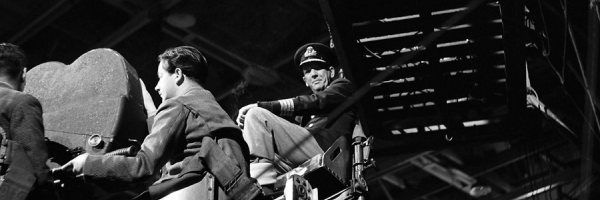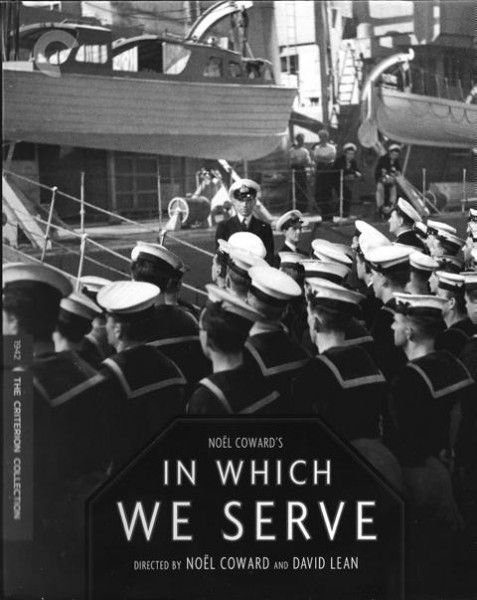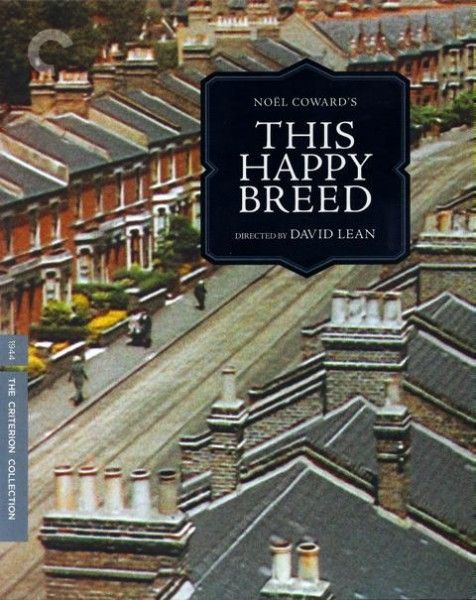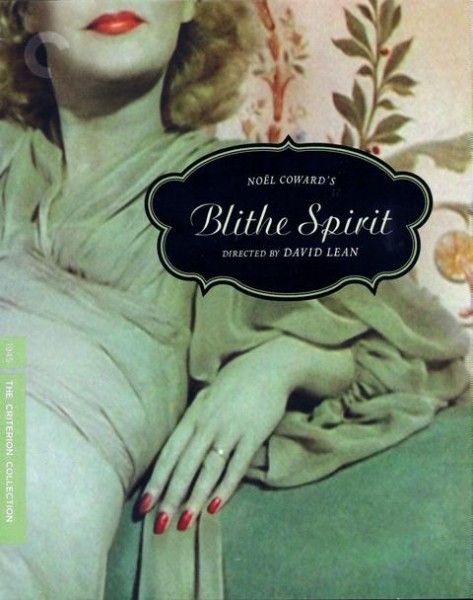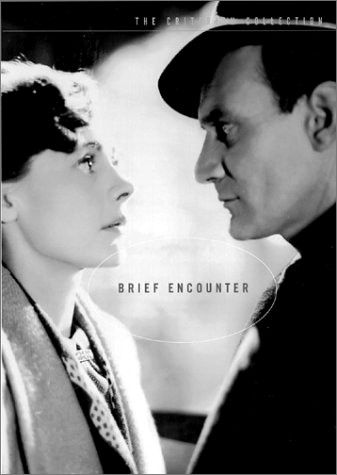David Lean has been canonized as one of the great directors, an honor that he’s earned, even if his body of work is inconsistent. If his later years were less good, and some of his earlier films are weak, it doesn’t matter. He directed Lawrence of Arabia and Bridge on the River Kwai. The Criterion collection has brought together his first four films, and they were all adaptations of Noel Coward’s work (hence the title David Lean “Directs Noel Coward”). The films are In Which We Serve, This Happy Breed, Blithe Spirit and Brief Encounter. And our review of the Blu-ray set of David Lean Directs Noel Coward follows after the jump.
In Which We Serve was David Lean’s directorial debut, and a credit he shared with Coward. The film follows the ship the HMS Torrin as it goes into battle and gets sunk. It then cuts to the lives of its crew. The Captain, “D” Kinross, is played by Coward, while some of the other cast includes John Mills, Celia Johnson and Richard Attenborough. The film flashes forward and back as it shows the men as they prepared to board the ship, and as they hang on for life on to a life raft. We see their home lives, a quickie marriage, and one soldier (Attenborough) who knows he’s a coward at heart.
This was a film made in 1942 by the Brits, and its value comes from how much one can stand propaganda. What Coward (who also wrote the film) brings to the situation is deep characterization that doesn’t always flatter. People die, some people are jerks, and it never pretends that everyone is noble. At the same time it is a war picture with an obvious goal. If I’m lukewarm on the film, it’s partly because it seems so meant for its period. As a director Lean was figuring everything out, but as he came from an editing background, the film comes together nicely. It’s a “good for what it is” film.
Criterion’s Blu-ray presents the film in full frame (1.37:1) and in 1.0 Mono The picture quality is excellent on the film, and the soundtrack is surely as good as it was upon release, if not better. Supplements include a conversation with Coward scholar Barry Day (16 min.) where he talks about what it meant for the two to work together, and Coward’s move into cinema. It’s followed by “A Profile of In Which We Serve” (24 min.) from 2000 that talks to John Mills and cinematographer Ronald Neame (among others). There’s some overlap with Day’s comments, but it’s a solid piece. It’s followed by “Coward and Attenborough at the NFT” (65 min.) where an audio commentary has the two reuniting in 1969 to talk about the film. The film’s theatrical trailer is also included.
This Happy Breed is the beginning of British’s Kitchen Sink cinema. The story of a middle class family from the end of World War I to the beginnings of World War II, it shows a family and the house they live in. The father is Frank Gibbons (Robert Newton) and his wife is Ethel (Celia Johnson). They have three children: Reg (John Blythe), Vi (Eileen Erskine) and Queenie (Kay Walsh). The parents are a proper sort, while the children get into all the trouble. Reg flirts with socialism, Vi gets married easily and Queenie runs away after rejecting the soldier next door Billy Mitchell (John Mills)
The film was shot in Technicolor, and it’s an interesting time capsule of London and the attitudes of its day. Much of it focuses on settling down, as all the children eventually move into serious relationships. There’s drama that comes from unexpected deaths, and rebellious children, but it mostly stays about the people. It’s a solid work, but borders on feeling like a history lesson. And though the film is in color, it’s mostly set in the house so it feels a bit stage-bound. It’s a good film, and fascinating, but a touch dull.
The film comes in full frame (1.37:1) and in 2.0 Monaural sound. The Technicolor transfer on this is excellent, the colors are perfect for what it is, and there’s not too much flickering. Extras on this disc include another discussion with Barry Day (15 min.), and “The Golden Age” (44 min.), an interview with the then 99 year old cinematographer and eventual director Ronald Neame. Even at that age, he’s a great interview, and provides wonderful anecdotes. It’s worth purchasing the whole set for his talk. He’s that good. The film’s trailer and re-release trailer are also included.
Blithe Spirit is a rare David Lean Comedy and he acquits himself well. The play was a huge success, and though Coward didn’t care for the new ending (likely done to appease the censors), it works well enough. Charles Condomine (Rex Harrison) is a happily married man when his wife (Constance Cummings) brings in a psychic to talk to the dead. Such summons his late wife Elvira (Kay Hammond) back into his life, and she doesn’t like being left behind.
The plays sets up that Harrison’s Charles is in a good but dull relationship, so the spice that a dead wife brings to things is interesting, and the play is the best of the set in representing Coward’s dry wit. In that was it’s a success, but – again – Lean is completely stage-bound with this Technicolor production, and the film never breathes because of it. As a comedy that works a little better, and the lines are droll, and the performers are interesting. The ending – as it is here – is actually a pretty great joke, so it’s too bad that Coward suggested they “fucked it all up.” It’s minor but charmingly so.
The Blu-ray is in full frame (1.37:1) and in 2.0 monaural sound. Here the picture quality shows the problems with Technicolor restoration. There’s a near-constant flickering of the image that often happens with older three strip films. Alas. It still looks good for its age. It comes with a Barry Day conversation (11 min.), and an episode of the Southbank Show on Noel Coward (51 min.), with interviews with Coward, John Gielgud, Daniel Massey and John Mills among others. The film’s theatrical trailer is also included.
The masterpiece of the set is Brief Encounter. Celia Johnson plays Laura Jesson, who starts the film by having a conversation with Dr. Alec Harvey (Trevor Howard) that’s interrupted by a friend. The doctor leaves, and Laura returns home to listen to the radio. As she sits, she reflects on the affair the two had. After a chance (brief) encounter, the two begin spending time together. She’s a slightly bored housewife, and the two have an obvious immediate connection. They don’t’ know how far they can go, and how to avoid seeing her friends, and when he gets an assignment far away, if it’s worth her getting a divorce.
Infidelity is a tough subject matter for cinema as it often turns into a moral tale where cheating is the ultimate sin. But here the subject matter of passion is as ripe as anything in cinema history. These star-crossed lovers have a problem, and that’s polite society and morality, and like any great love story, that’s usually the barrier. Ang Lee must be a huge fan of this film, and it shows. What’s also great about it is that Lean doesn’t muck about. It was based on a one-act play, and more so that any of the other films in this set, it feels free to be a movie. From how the narrative unfolds as a flashback, to a great fantasy sequence, this is a great cinematic work from everyone involved. The performances are top notch across the board, and the troubles they face are completely empathetic. It’s a masterful work, Lean’s first great film, and is rightly lauded as one of the best films of all time. Lean – at the time – heard snickers in test screenings and for a long time thought it was a failure. He was wrong.
Criterion presents the film in full frame (1.37:1) and in 2.0 monaural sound. As the crown jewel of the set, it feels best looked after. As Criterion had released it before there is a commentary from that set by Bruce Eder, who walks through the film very well as he talks about the scenes and also the making of. Very listenable. Barry day provides a talk about this film (16 min.), and it’s followed by “A Profile on Brief Encounter” (25 min.) done in 200, with comments from Neame, actress Margaret Barton, and Celia Johnson’s daughter. But the best supplement is “David Lean: A Self Portrait” (58 min.) which had Lean – in 1971 – talk about his career up to that point. He’s a genial host, and offers a lot of insight into all his work. The film’s theatrical trailer is also included.

